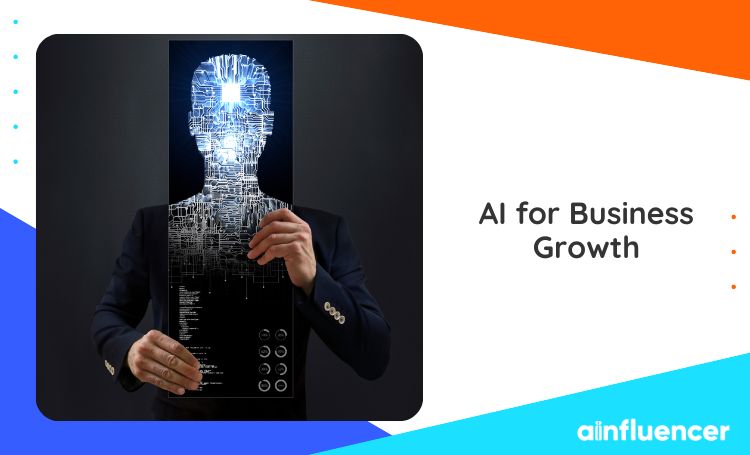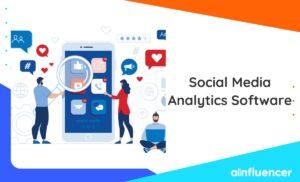It’s become impossible to escape the talk of artificial intelligence and how it’s poised to upend practically every facet of our society. While part of the buzz boils down to trying to cash in on the latest tech fads, there’s a compelling case for the role of AI for business growth and development.
AI tools can help with areas of business growth like customer and talent acquisition, market insights, and product innovation. How exactly? In this in-depth look at AI’s transformative impact on doing business today and beyond, we provide an overview of the benefits, various use cases, and several key considerations.
Why is AI Beneficial for Your Business?
AI’s specific benefits will depend on the scope and nature of your business. Even so, it comes down to streamlining processes, improving efficiency, and freeing humans to focus on the intricacies of their roles, leaving AI to take care of the grunt work.
We’re still in the early stages of AI adoption and development. Yet, any industry can benefit from one or more types of AI to further its growth. For example, a company specializing in manufacturing may use AI’s predictive capabilities to detect defects and inefficiencies in its processes or optimize inventory management. On the other hand, an e-commerce company will benefit from market analytics, customer insights, and chatbots the most.
It’s no longer a question of whether or not you should be integrating AI into your business strategy. Rather, you should assess your company’s bottlenecks and aspirations and then choose the AI-driven product(s) that best satisfy them.
4 Benefits of AI for Business Growth
Before answering, it’s crucial to understand that AI is neither a cure-all nor a monolithic technology. Generative AI, machine learning, large language models, and natural language processing are just some of the forms it can take, each trying to mimic one or several aspects of human intelligence. They excel at different tasks, each with exceptional growth potential.
Here are the most compelling use cases of AI for business growth today.
#1 Automation
Automation is among the oldest and most versatile applications of AI for business growth. It takes over mundane, repetitive tasks so humans can focus on more creative or strategic pursuits. When set up correctly, automation significantly improves productivity while eliminating human error.
For example, an online retailer can set up an AI tool to scan customer interactions through email, social media, etc., adding or updating CRM information on prospects and customers whenever it becomes available. Large enterprises swamped with job applications may use AI to screen CVs against desired criteria and leverage machine learning algorithms to pick the most compatible candidate among initial qualifiers.
Automation’s practical applications are already numerous. Some companies use it to streamline the onboarding of new hires. Others rely on it to schedule social media posts, segment users for targeted email blasts, or even handle mundane aspects of payroll.
#2 Data Analysis
Even small businesses generate so much data daily through product sales, marketing efforts, or customer interactions. One of AI’s main draws is the ability to absorb, sort, and interpret such data. This results in insights human decision-makers increasingly rely on to make evidence-based decisions that define their business’s trajectory.
Analyzing previous sales data can help businesses develop optimal, dynamic pricing that ensures sustainable margins regardless of season and factors like inflation. Such data is also useful for inventory management, as it enables optimal stocking year-round with advance warning for surges and slumps.
Sentiment analysis is another essential form of AI-driven predictive analytics. The public isn’t shy about expressing its feelings about products and services. This provides machine learning algorithms and LLMs with enough data to gauge the public’s disposition with nuance. Doing so lets you assess marketing campaign efficiency, address shortcomings, and identify features future versions of your products should implement.
#3 Shaping the Customer Experience
Quality and fair pricing aren’t necessarily the deciding patronage factors anymore. Today’s customers, especially younger ones fully immersed in the digital world, seek personalized experiences that conventional marketing and customer service can’t handle.
Enter AI and its ability to help you pinpoint prospects most receptive to targeted advertising. Identifying them narrows your outreach but boosts success rates since targeted people don’t mind seeing and responding to advertisements about goods and services they actually care about.
Advances in natural language processing have brought us to a point where chatbots can do customer service people’s jobs more effectively in several ways. They’re available round the clock, ensuring interested visitors get all the information they need. Chatbots can answer questions, offer personalized recommendations, or book appointments without involving humans.
#4 Boosting Creativity
The public debut of generative AI tools unleashed a deluge of content that was already having a profound impact on the internet. Countless businesses and individuals have jumped at the chance to use these tools and create content with minimal effort and mixed results. While brainlessly copy-pasting generated content may end up hurting your business, it would be foolish not to engage GenAI’s services in other ways.
Prompting AI to assist in your marketing efforts is a good plan. For example, you can use ChatGPT to list ideas for social media posts or website copy you’re working on, which can get the creative juices flowing. Likewise, asking Midjourney to generate a logo or image to accompany a blog post can provide a basis for building your brand’s established voice and identity.
Are There Concerns Regarding the Usage of AI for Business Growth?
Few technological advancements rival AI when it comes to creating a buzz. Everyone seems to be jumping on the bandwagon. Yet, there’s a difference between selectively adopting AI to further your goals and rushing into acquiring underdeveloped tools just to look like you’re at the cutting edge of technology.
Integrating AI into your existing workflows securely should be a top priority. AI tools need access to large quantities of data. Much of it may be proprietary, sensitive, or put users at risk if it ever gets stolen. Thoroughly vetting AI vendors and shoring your own defenses up with security tools like a password manager with MFA will ensure that data remains protected even if accounts are compromised.
Training employees to work with AI goes beyond teaching them the best prompts to use. Accessing AI tools remotely risks exposing sensitive information, especially if employees do so via unsafe means like public Wi-Fi. It’s better to rely on secure cell data instead, which they can even do cost-effectively abroad if they take advantage of international eSIM services.
Lastly, there’s the matter of AI’s reliability. Despite appearances, tools like ChatGPT lack the human capacity to tell the truth apart from fabrication. A lack of data doesn’t prevent them from hallucinating answers that sound correct but aren’t grounded in reality. Keep such limitations in line when relying on AI for important work tasks.
Conclusion
The age of AI has barely begun, and we can already witness the groundbreaking changes the technology’s rapid development has on the digital and real world alike. We hope you now have a better understanding of how to leverage AI to improve various aspects of your business and will do so efficiently yet responsibly.
FAQs
AI offers several advantages to small businesses, including automation of routine tasks, data analysis for informed decision-making, enhanced customer interactions through chatbots, and cost-effective marketing strategies through targeted advertising.
AI is widely used for automating customer support with chatbots, predicting consumer behavior through data analysis, optimizing supply chain management, and personalizing marketing campaigns based on individual preferences and browsing histories.

![Read more about the article Best Shopify Alternatives in 2024: [Free & Paid]](https://blog.ainfluencer.com/wp-content/uploads/2024/01/featured-300x182.jpg)

![Read more about the article Marketing to Gen Z: [Proven Strategies & Practices in 2024]](https://blog.ainfluencer.com/wp-content/uploads/2024/04/jpeg-optimizer_facebook-1-300x182.jpg)





